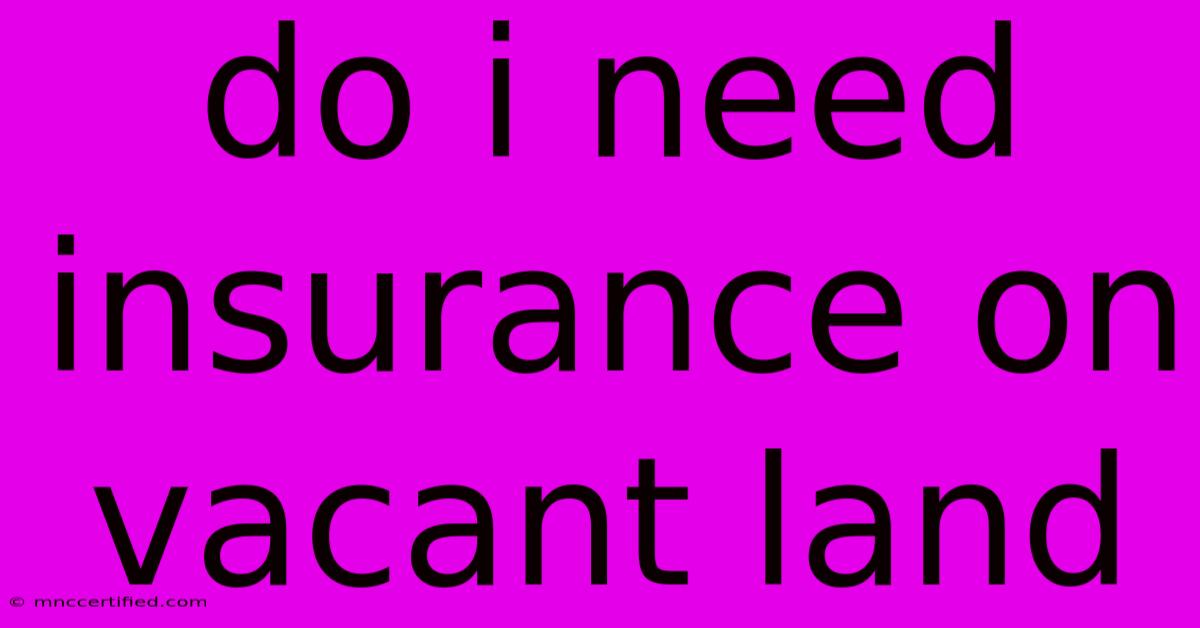Do I Need Insurance On Vacant Land

Table of Contents
Do I Need Insurance on Vacant Land? A Comprehensive Guide
Owning vacant land presents unique challenges, and one of the most crucial decisions you'll face is whether or not to obtain insurance. While it might seem unnecessary to insure unused property, the reality is that vacant land is susceptible to various risks, making insurance a smart financial investment. This comprehensive guide explores the need for vacant land insurance, the types of coverage available, and factors to consider when making your decision.
Why Insure Vacant Land? It's Not Just About the Land Itself
Many landowners mistakenly believe that vacant land doesn't require insurance. This misconception can lead to significant financial losses in the event of unforeseen circumstances. Here's why insurance is essential:
-
Liability Protection: This is arguably the most important reason to insure vacant land. Even if your land is empty, you are still legally responsible for any accidents or injuries that occur on it. Someone could trespass, get injured, or even sue you for damages. Liability insurance protects you from these potentially devastating financial consequences.
-
Property Damage: While there's no structure to insure, your land itself can suffer damage. Environmental hazards, like sudden sinkholes or erosion, can significantly devalue your property. Vandalism and theft of resources (like gravel or topsoil) are also common risks. Insurance can help cover the costs of remediation or restoration.
-
Third-Party Damage: If a fire starts on your vacant land and spreads to a neighboring property, causing damage to their structures or possessions, you could face significant legal and financial liability. Insurance safeguards you from such scenarios.
-
Protecting Your Investment: Vacant land is often viewed as a long-term investment. Protecting that investment from unforeseen risks is crucial. Insurance provides financial security and peace of mind, allowing you to focus on the future value of your land.
Types of Insurance for Vacant Land
Several insurance options are available to protect your vacant land, depending on your specific needs and risks:
-
Landowner's Liability Insurance: This is the most basic type of coverage and usually covers liability for injuries or damages occurring on your property, regardless of whether the injured party was trespassing.
-
Umbrella Liability Insurance: This offers additional liability protection beyond the limits of your basic policy. It's a wise choice if you want extensive protection against potentially high-cost lawsuits.
-
Environmental Insurance: This specialized coverage protects against environmental contamination or hazards, such as the cost of cleaning up a polluted site.
-
Inland Marine Insurance: This covers property temporarily away from a fixed location, which can be useful if you store equipment or materials on your vacant land.
Factors Influencing Your Insurance Needs
Several factors determine the type and extent of insurance coverage you'll require:
-
Location: The risk of natural disasters (wildfires, floods, etc.) and the crime rate in your area significantly impact your insurance needs.
-
Accessibility: Easy access to your property increases the risk of trespassing and vandalism, making liability coverage even more critical.
-
Size and Topography: Larger or more rugged parcels of land may carry a higher risk and, therefore, higher insurance premiums.
-
Intended Use: If you plan to use the land for specific activities (e.g., storing equipment), you'll need insurance that adequately covers those uses.
Finding the Right Insurance for Your Vacant Land
Finding the right insurance for your vacant land requires careful research. Contact multiple insurance providers to compare quotes and coverage options. Be upfront about the intended use of your land and any potential risks to obtain the most appropriate and cost-effective coverage.
In Conclusion:
While insuring vacant land might seem like an unnecessary expense, the potential financial liabilities far outweigh the cost of insurance. Protecting your investment and mitigating potential risks through adequate insurance coverage is crucial for responsible land ownership. Don't wait for a disaster to strike; take proactive steps to secure your vacant land today. Contacting an insurance professional to discuss your specific needs is the best way to determine the appropriate level of coverage.

Thank you for visiting our website wich cover about Do I Need Insurance On Vacant Land. We hope the information provided has been useful to you. Feel free to contact us if you have any questions or need further assistance. See you next time and dont miss to bookmark.
Featured Posts
-
Gerald Franson Insurance Covington
Nov 16, 2024
-
Does Insurance Pay For Rhinoplasty
Nov 16, 2024
-
Eagles De Jean From Quiet To Prominent
Nov 16, 2024
-
Rfk Jrs Health Policy Claims Fact Checked
Nov 16, 2024
-
Keloid Removal Cost With Insurance
Nov 16, 2024